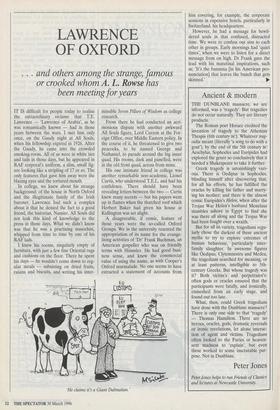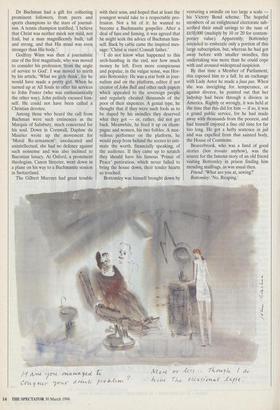LAWRENCE OF OXFORD
and others among the strange, famous
or crooked whom A. L. Rowse has
been meeting for years
IT IS difficult for people today to realise the extraordinary reclame that T.E. Lawrence — 'Lawrence of Arabia', as he was romantically known — had in those years between the wars. I met him only once, on the Gaudy night at All Souls, when his fellowship expired in 1926. After the Gaudy, he came into the crowded smoking-room. All of us were in white ties and tails in those days, but he appeared in RAF corporal's uniform, a slim, small fig- ure looking like a stripling of 17 or so. The only features that gave him away were the blazing eyes and the tortured mouth.
In college, we knew about his strange background: of the house in North Oxford and the illegitimate family of the Irish baronet. Lawrence had such a complex about it that he denied the fact to a good friend, the historian, Namier. All Souls did not leak this kind of knowledge to the press in those days. What we didn't know was that he was a practising masochist, whipped from time to time by one of his RAF lads.
I knew his rooms, singularly empty of furniture, with just a few fine Oriental rugs and cushions on the floor. There he spent his days — he wouldn't come down to reg- ular meals — subsisting on dried fruits, raisins and biscuits, and writing his inter- minable Seven Pillars of Wisdom as college research.
From there he had conducted an acri- monious dispute with another awkward All Souls figure, Lord Curzcin at the For- eign Office, over Middle Eastern policy. In the course of it, he threatened to give two peacocks, to be named George and Nathaniel, to parade around the big inner quad. His rooms, dark and panelled, were in the old front quad, across from mine.
His one intimate friend in college was another remarkable non-academic, Lionel Curtis, who understood T.E.L. and had his confidence. There should have been revealing letters between the two — Curtis knew many secrets — but his papers went up in flames when the thatched roof which Herbert Baker had given his house at ICidlington was set alight.
A disagreeable, if comic, feature of those years were the so-called Oxford Groups. We in the university resented the appropriation of its name for the evange- lising activities of 'Dr' Frank Buchman, an American gospeller who was on friendly terms with Himmler. He had good busi- ness sense, and knew the commercial value of using the name, as with Cooper's Oxford marmalade. No one seems to have extracted a statement of accounts from 'He claims it's a Giant Dalmatian.' him covering, for example, the corporate sessions in expensive hotels, particularly in Switzerland, his headquarters.
However, he had a message for bewil- dered souls in that confused, distracted time. We were to confess our sins to each other in groups. Early mornings had 'quiet times', when we were to listen for a direct message from on high. Dr Frank gave the lead with his matutinal inspirations, such as: 'It's the bananna [in his American pro- nunciation] that leaves the bunch that gets skinned.' Dr Buchman had a gift for collecting prominent followers, from peers and sports champions to the stars of journal- ism. A tennis champion testified, 'I believe that Christ was neither meek nor mild, nor frail, but a man magnificently built, tall and strong, and that His mind was even stronger than His body.'
Godfrey Winn was then a journalistic star of the first magnitude, who was moved to consider his profession 'from the angle of service to God'. I was moved to mirth by his article, 'What we girls think', for he would have made a pretty girl. When he turned up at All Souls to offer his services to John Foster (who was enthusiastically the other way), John politely excused him- self. He could not have been called a Christian devotee.
Among those who heard the call from Buchman were such eminences as the Marquis of Salisbury, much concerned for his soul. Down in Cornwall, Daphne du Maurier wrote up the movement for 'Moral Re-armament': uneducated and unintellectual, she had no defence against such nonsense and was also inclined to Baconian lunacy. At Oxford, a prominent theologian, Canon Streeter, went down in a plane on his way to a Buchmanite session in Switzerland.
The Gilbert Murrays had great trouble with their sons, and hoped that at least the youngest would take to a respectable pro- fession. Not a bit of it: he wanted to become a Buchmanite gospeller. After a deal of fuss and fuming, it was agreed that he might seek the advice of Buchman him- self. Back by cable came the inspired mes- sage: 'Christ is risen! Consult father.'
I do not know what happened to this arch-humbug in the end, nor how much money he left. Even more conspicuous and popular, in the vulgar sense, was Hor- atio Bottomley. He was a star both in jour- nalism and on the platform, editor if not creator of John Bull and other such papers which appealed to the sovereign people and regularly cheated thousands of the poor of their sixpences. A genial type, he thought that if they were such fools as to be duped by his swindles they deserved what they got — or, rather, did not get back. Meanwhile, he lived it up on cham- pagne and women, his two foibles. A mar- vellous performer on the platform, he would peep from behind the scenes to esti- mate the worth, financially speaking, of the audience. If they came up to scratch they should have his famous 'Prince of Peace' peroration, which never failed to bring the house down, their tender hearts so touched.
Bottomley was himself brought down by venturing a swindle on too large a scale — his Victory Bond scheme. The hopeful members of an enlightened electorate sub- scribed their small savings to the tune of 650,000 (multiply by 10 or 20 for contem- porary value). Apparently, Bottomley intended to embezzle only a portion of this large subscription, but, whereas he had got away before with smaller swindles, this undertaking was more than he could cope with and aroused widespread suspicion.
By that time a Member of Parliament, this exposed him to a fall. In an exchange with Lady Astor he made a faux pas. When she was inveighing for temperance, or against divorce, he pointed out that her ladyship had been through a divorce in America. Rightly or wrongly, it was held at the time that this did for him — if so, it was a grand public service, for he had made away with thousands from the poorest, and had himself enjoyed a fine old time for far too long. He got a hefty sentence in jail and was expelled from that sainted body, the House of Commons.
Beaverbrook, who was a fund of good stories (ben trovato anyhow), was the source for the famous story of an old friend visiting Bottomley in prison finding him mending mailbags, as was usual then.
Friend: 'What are you at, sewing?'
Bottomley: 'No. Reaping.'



























































 Previous page
Previous page